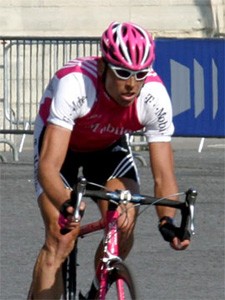Mental exhaustion hits German after he loses court action against Werner Franke
 Former Tour de France winner Jan Ullrich has announced that he is withdrawing from public life for the foreseeable future after being diagnosed with burnout syndrome. The 1997 Tour victor announced the news on on his website on Friday, and appealed to be left alone.
Former Tour de France winner Jan Ullrich has announced that he is withdrawing from public life for the foreseeable future after being diagnosed with burnout syndrome. The 1997 Tour victor announced the news on on his website on Friday, and appealed to be left alone.
“A few days ago I was diagnosed with burnout syndrome, which will probably require a lengthy treatment. To enable a speedy recovery, I will therefore withdraw completely in the coming months from the public,” he said. “For obvious reasons, I don’t wish to comment further on this. I ask you for your understanding and appeal to all media to respect and protect our privacy.
“I will face this new challenge in the coming weeks – and, on behalf of my family, I thank you in advance for your support.”
Burnout syndrome was defined as a form of mental exhaustion in 2000 by A. Weber and A. Jaekel-Reinhard of the Institute and Outpatient Clinic for Occupational, Social and Environmental Medicine of the University of Erlangen-Nuremberg, Germany. “According to the most common description at present, burnout syndrome is characterized by exhaustion, depersonalization and reduced satisfaction in performance,” they wrote. “Because of its aetiopathogenesis, burnout is today mainly regarded as the result of chronic stress which has not been successfully dealt with.”
In more plain terms, it is a severe stress caused by work-related physical or mental trauma
Olympic champion under pressure:
Ullrich has been under scrutiny since May of 2006 when he was implicated in Operación Puerto. He was a non-starter in that year’s Tour de France and was later fired by his T-Mobile team on suspicion of doping. He always denied taking banned substances, but DNA tests confirmed that blood bags seized from Dr. Eufemiano Fuentes’ clinic in Madrid were a match for the German rider.
In addition to that, his former tea manager and mentor Rudy Pevenage recently admitted that he had helped co-ordinate the rider’s drug use. “I never bought or sold doping products,” he told l’Equipe in July. “I only organised the trips for Jan.”
He that the decision to use the Spanish doping doctor was taken after Ullrich tried to cut back on his consumption of banned products, but found that he was no longer as competitive as he had been. “At T-Mobile everything stopped after 1998 and I can say that our team was really clean in the years after the Festina Affair. But, slowly, looking at the results, we realised that we were lagging behind the other teams, especially the Spanish and the Italians,” said Pevenage.
The timing of Ullrich’s announcement today coincides with a ruling against him by a German court in relation to a dispute with anti-doping campaigner Werner Franke. The Hamburg state court has dismissed a suit by the rider, who was trying to stop Franke from making claims that he had paid €35,000 to Fuentes for doping. Ullrich denied doping under oath and could in theory face perjury charges.
The rider received a message of support on Friday from his former T-Mobile team-mate Andreas Klöden. “Get well soon to my friend Jan (Ulle), take the time to be healthy again. Your friends always stand behind you,” stated the RadioShack rider on Twitter.
Ullrich won the Tour de France in 1997, having been runner up in his first attempt one year previously. He finished second a total of five times, and also won the Vuelta a España in 1999, the Olympic road race in 2000 and the world time trial championships in 1999 and 2001. His last professional victory was the Tour de Suisse in 2006.